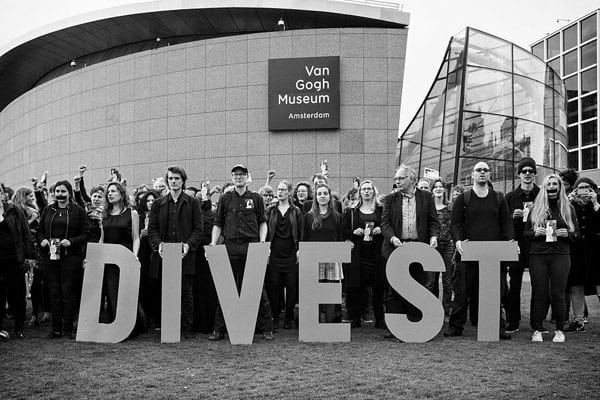
August 31, 2018; Hyperallergic
Back in the spring, NPQ covered the “weird civic playground of nonprofit museums” in the United States, taking a look at the often highly political role of the kings of industry (and the rest of us) on the boards of cultural institutions. Zachary Small of Hyperallergic now brings us up to date on how culture/commerce relationships are going overseas.
Recently, in the face of growing protests by activists, both the Van Gogh Museum in Amsterdam and the Mauritshuis in The Hague terminated long-term, financially lucrative partnerships with multinational oil and gas company Royal Dutch Shell, which has a reputation for both environmental and human rights violations. While Shell says the split was mutual, both sides of the partnership were feeling the heat of public concerns about relationships forged between businesses of questionable reputation and cultural institutions. As readers may remember, in 2016, the Tate also announced that it would end its 26-year sponsorship agreement with BP.
As was to be expected, the protests fit the target in their reliance on performance art. A spokesperson for Fossil Free Culture NL, which recently staged a six-week “Art Storm” series aimed at the Van Gogh, told Hyperallergic that “Through unsolicited art performances in institutions that accept such sponsorship, we expose the ecological and social devastation that the fossil fuel industry inflicts on the planet, and lay bare the way these cultural institutions actively sanitize the reputation of companies like Royal Dutch Shell.”
Hyperallergic reports that:
Sign up for our free newsletters
Subscribe to NPQ's newsletters to have our top stories delivered directly to your inbox.
By signing up, you agree to our privacy policy and terms of use, and to receive messages from NPQ and our partners.
In 2017, members of Fossil Free Culture were arrested at the museum after security guards called the police on their “Drop the Shell!” performance, during which seven people sipped an oil-looking liquid from seashells as a performer recited a passage from a Vincent van Gogh letter to his brother about rising waters and the struggle to survive.
“Fossil fuel companies fund cultural institutions to clean up their public image. This recognized marketing strategy is known as art-washing. For a tiny slice of their enormous PR budgets, oil and gas companies are able to buy a false image of cultural and societal generosity,” said Fossil Free Culture’s spokesperson. “Their motivation has nothing to do with cultural benevolence; it is a strategy to secure the social respectability they desperately need to continue their destructive business as usual.”
But Shell has not retreated from the cultural scene, reports Small, noting that British environmental activist group Culture Unstained is on the case there, as Shell inserts itself into the science museum scene. Culture Unstained’s Chris Garrard wrote to Hyperallergic, “For a museum of science to partner with one of the world’s most unethical fossil fuel companies—and just as the Van Gogh Museum and the Mauritshuis were preparing to cut their ties to Shell—exposes how out of touch the [Science and Industry Museum] is…It’s deeply concerning that the museum was fully aware of Shell’s human rights violations, its links to the spread of climate disinformation, and its extensive environmental impacts but chose to go ahead with the deal regardless.”
A petition with 56,000 signatures stands in protest to the museum’s relationship, and “one of the exhibition partners has pulled out of the show in protest alongside 50 respected scientists and researchers who have sent an open letter to the museum’s director against the Shell sponsorship decision.”—Ruth McCambridge













